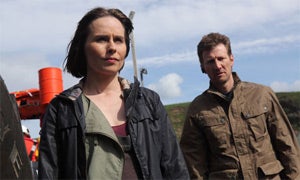Last Night's TV - The Body Farm, BBC1; The Bomb Squad, BBC1
Already looking dead and buried

The Buddhist practice of "corpse meditation" includes some helpful themes to get you started. You might choose vipubbaka, in which you imagine a "festering corpse, oozing lymph and pus from its various orifices". Or hatavikkhittaka, in which you're enjoined to contemplate the "corpse of a person violently murdered, slashed and stabbed with various weapons, covered with wounds... some parts hacked so that they're almost detached". The idea, I gather, is to purge yourself of revulsion and to address the universal fate of all mankind. Alternatively, you could just watch The Body Farm instead, which, like quite a few crime thrillers these days, appears to have spent a big part of its budget on corpse procurement. The thing had barely begun before the camera panned across a wetly glistening body in a greenhouse, vivid red worms holding a rave in its abdomen as a cheerful young woman reported good news to her boss: "We've got plant growth... the seeds from his last meal have taken root." And after that things got really grisly.
Somebody will one day write an interesting thesis about the foregrounding of the corpse in television police procedural, its transformation from a blurry lump in the foreground – never inspected too closely – into an element in a kind of gruesome arms race, with each successive drama vying to come up with an even ghastlier specimen. Since this spin-off from Waking the Dead is set in a Home Office forensic research station, investigating decomposition rates and maggot life cycles, I have a feeling they're going to pull ahead of the competition. They certainly began with a trump card, Tara Fitzgerald's pathologist character Eve being called out to investigate a bathroom in a derelict flat in which every surface had been impastoed with the puréed remains of two people, a kind of human Anaglypta. Fortunately, nobody who works on the team appears to have a sense of smell or, for that matter, of atrocity. "Soon as we break through the initial crust of outer decay, we're going to get into major maggot mass," says Eve, in the tone of voice you might use to warn someone to avoid a puddle. Is she a Buddhist, I wonder, or just numb?
Last night's episode began with the kind of solemn, cod-philosophical voiceover with which these things like to dignify their morbid pleasure in gross spectacle. What they really relish, though, is cod-science, which in this case included virtually instantaneous DNA analysis, funky voice control on the lab computer and tsetse flies that had somehow been trained as body-fluid tracker dogs. When matched with cod-police procedural (all sorts of people tramping through the crime scene and an Asperger's type back at the lab who seems to have free rein to dabble his fingers in bits of the evidence) the odour of over-ripe fish all becomes a bit too much. "Who else can do what we do?" asks Eve's handsome colleague (the old flame who isn't entirely extinguished). "Nobody," she replies. Too right there, love, since virtually everything you do is bad science fiction.
The plot of The Body Farm featured an army bomb-disposal expert deafened by an IED and its style drew heavily on lightweight shoulder cameras, feeding back a first-person view to team members back in the lab. Both of these elements also turned up, in infinitely more distinguished fashion, in The Bomb Squad, the first of a two-part documentary about a bomb disposal team in Afghanistan. It focused mostly on Adam, who takes a sanguine approach to his nerve-shredding job: "If I went out thinking the next day was going to be my last all the time, I wouldn't be able to work," he said. I suppose the same could be said of all of us, but then our in-tray isn't exclusively filled with things that have been expressly designed to kill us. Adam's helmet camera offered a sweatily intimate view of a kind of archaeology under fire. And even more dangerous than Adam's job, statistically speaking, is that of the searchers, who walk around trying to find the IEDs, so that he can defuse them. Theoretical danger shockingly became real after one of the contributors to the film – a likeable young man who'd talked candidly about his fears – stepped on an IED while on patrol, losing both legs and his left arm. Immediately afterwards you saw one of Adam's superiors bickering on the radio over his estimate of the amount of explosives involved: he felt the suggested amount wouldn't have sent his foot and boot 70 metres away. And suddenly the fake damage and fake death in The Body Farm struck you as a rather tawdry kind of entertainment.
Join our commenting forum
Join thought-provoking conversations, follow other Independent readers and see their replies
Comments
Bookmark popover
Removed from bookmarks